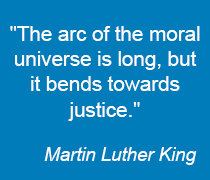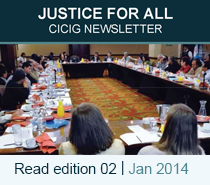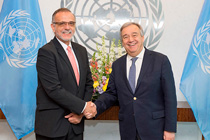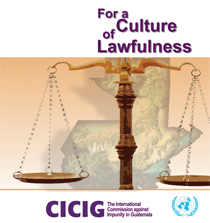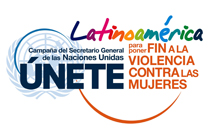PRESS RELEASE 015
CICIG DENOUNCES JUDGE FOR IRREGULARITIES
 Guatemala, March 16, 2012. Today, the International Commission against Impunity in Guatemala denounced the judge of the First Court of Children and Adolescents in Conflict with Criminal Law, Rossana Maribel Mena Guzmán. The complaint was filed on the grounds that Mena Guzmán allegedly committed malfeasance of office, abuse of authority, omission and alteration of marital status, usurpation of authority, failure to report an offence, malicious delay, human trafficking and maltreatment of minors.
Guatemala, March 16, 2012. Today, the International Commission against Impunity in Guatemala denounced the judge of the First Court of Children and Adolescents in Conflict with Criminal Law, Rossana Maribel Mena Guzmán. The complaint was filed on the grounds that Mena Guzmán allegedly committed malfeasance of office, abuse of authority, omission and alteration of marital status, usurpation of authority, failure to report an offence, malicious delay, human trafficking and maltreatment of minors.
CICIG became aware of the severity and illegality of actions taken by Judge Mena in exercising her functions through the institutional support it offered in the area of adoptions together with the Public Prosecutor's Office, the Attorney General of the Nation's Office (PGN) and the National Council for Adoption (MP). The illicit acts concern protection measures awarded to Guatemalan children within her jurisdiction.
THE COMPLAINT CONCERNS THE ILLEGAL ACTS ALLEGEDLY COMMITTED IN 7 PROTECTION PROCEEDINGS. THE FOLLOWING ARE THE ACTS DENOUNCED IN RELATION TO SAID PROCEEDINGS:
- PROTECTION MEASURES CASE FILE P-117-2008: The defendant illegally and unjustifiably deprived a child of the right to an identity and ordered that he be registered in the National Persons Register as the child of parents that were unknown to him. This occurred even though the biological mother had appeared before the defendant and had fully identified herself. The illegal situation continues to this day. Furthermore, in disregard for the fundamental national and international regulations on adoption, the accused issued a declaratory ruling on the eligibility for adoption without complying with consent requirements and the need to brief parents in voluntary adoption cases, in accordance with Articles 35 and 36 onwards of the Adoptions Law.
The accused party also attributed herself functions and powers that do not fall under her purview, she fostered the creation of a loving bond between the child and the US family set to adopt him, and thus subordinated and limited the functions and powers of the National Council for Adoption. Furthermore, this prevented the "subsidiarity" of international adoptions from being effective, which states the need for exhausting all the possibilities of placing the child with the biological family, extended family or with a domestic adoptive family.
- PROTECTION MEASURES CASE FILE 1401-2005: The judge of the First Court of Children and Adolescents and of Young Persons in Conflict with the Law, Rossanna Maribel Mena Guzmán, in the processing of case file 1401-2005, violated the fundamental rights of the child by depriving him of the right to be brought up within his family nucleus, to preserve his identity and hence his family ties.
The accused processed the aforementioned file and abused her powers, causing the child's separation from his family despite the fact that the biological mother had declared her desire to regain her child. The judge failed to consider that the child was taken illegally and had not been abandoned. The accused did not search for members of the child's extended family, who potentially would have been an ideal care solution. As a result, the mother and child were separated and institutionalized for roughly four years.
- PROTECTION MEASURES CASE FILE 1064-2008-00420: Judge Rossanna Maribel Mena Guzmán, in disregard for the most basic national and international adoption regulations, issued a declaratory adoptability judgment without fulfilling the consent requirements or the need to brief the biological parents, both of which are necessary in voluntary adoption cases. Therefore, the judge violated the provisions of Articles 35 and 36 of the Adoptions Law.
The accused party also attributed herself functions and powers that do not fall under her purview, she fostered the creation of a loving bond between the child and the US family set to adopt her, and thus subordinated and limited the functions and powers of the National Council for Adoption. Furthermore, this prevented the "subsidiarity" of international adoptions from being effective, which states the need for exhausting all the possibilities of placing the child with the biological family, extended family or with a domestic adoptive family.
Even though the judge was made aware of the alleged biological mother's address, the latter was not personally summoned to be present at the proceedings. The accused failed to take any steps to order that a care solution be sought within the extended family.
- PROTECTION MEASURES CASE FILE 1141-2008-00180: In the processing of the protection measures, the accused judge violated the fundamental rights of the child and his family by illegally and unjustifiably depriving him of the right to maintain his identity, to know who his parents are and to be looked after by them. The judge fostered the creation of a loving bond between the child and the foreign family that intended to adopt, subordinating and limiting the role of the National Council for Adoption.
The accused judge failed to take into consideration the extended family (paternal grandfather) as the ideal care solution for the child in order to avoid breaking down the emotional ties between the child and the family nucleus. The judge did so without accordingly notifying the biological parents of the hearings held prior to issuing the judgment, without respecting national and international child protection regulations—despite being the person constitutionally responsible for protecting the rights of children. Furthermore, despite the information set forth in reports (which are included in the case file), the judge issued a ruling in non-compliance of Articles 4 and 14 of the Hague Convention on Protection of Children and Cooperation in Respect of Intercountry Adoption and Articles 9, 10, 35 and 43 of the Adoptions Law.
The accused judge attributed herself functions and powers that do not fall under her purview (but rather that of the National Council for Adoption) and, throughout the whole procedure, she encouraged greater account to be taken of the family that intended to adopt. (The proceedings were suspended due to irregularities.) The judged acted in the aforementioned manner even though the paternal grandmother had stated her desire to care for the child (extended family). Furthermore, the judge failed to comply with the provisions of Articles 7, 8 and 21 of the Convention relative to Children's Rights; Articles 18, 19, 20, 21 and 80 of the Law on Comprehensive Protection of Children and Adolescents (PINA); and Articles 9, 10, 35, and 43 of the Adoptions Law. The judge, completely subordinating the functions and powers of the National Council for Adoption, limited the Council's ability to exhaust all possibilities of placing the child with the biological family, the extended family or with a domestic adoptive family.
- PROTECTION MEASURES CASE FILE 01064-2008-00396: The judge of the First Court of Children and Adolescents and Youth in Conflict with the Law, Rossanna Maribel Mena Guzmán, violated the fundamental rights of the child in the processing of the protection measures file by depriving her of the right to be brought up within her family, to maintain her identity and her family ties.
During the processing of the protection measures file, it was corroborated that the biological mother of the child had claimed her right to care for the child. Therefore, the consent given at the beginning of the adoption process was annulled. In addition, the Attorney General of the Nation's Office (PGN) presented reports in which the existence of an ideal intra-family care solution was reported. Next-of-kin of the child, in addition to the biological mother, gave their consent to look after the child.
However, the accused party paid no heed to the provisions of Articles 7, 8 and 21 of the Convention on the Rights of the Child; Articles 18, 19, 20, 21, 22 and 80 of the Law on Comprehensive Protection of Children and Adolescents (PINA); Articles 4 and 14 of the Hague Convention on Protection of Children and Cooperation in Respect of Intercountry Adoption; and Articles 9, 10, 35 and 43 of the Adoptions Law. The accused party failed to show consideration for the remorse shown by the mother and her desire to recover custody of the child, and she also disregarded the duty to exhaust all possibilities in the search for and localization of the extended family that could potentially care for and protect the child.
The Chamber of the Court of Appeals for Children and Adolescents, on September 22, 2009, reversed the ruling that was clearly illegal and issued in breach of constitutional requirements and international agreements on human rights and child protection, as stated by the ad quem court.
- PROTECTION MEASURES CASE FILE P-777-2007: The accused judge of the First Court for Children and Adolescents of Guatemala processed the protection file, under number P-777-2007, abusing her position by usurping and distorting the powers and functions that are conferred upon the Public Prosecutor's Office (MP) by the Constitution and as set forth in the Organic Law of the Public Prosecutor's Office. In addition, on June 24, 2011, by means of a hearing to verify measures, she issued a ruling that provided for the following: "III) The Public Prosecutor's Office (MP) shall request that the Court of the First Criminal Instance dismiss the criminal case concerning the aforementioned child, and it shall send a certified copy of the ruling to this court and to the National Council for Adoption. In consequence, it will be possible to continue with the above administrative adoption procedure of the child. Written verification of the order should be provided within a month."
These actions taken by the accused party constitute a direct attack against the very legal nature of the Public Prosecutor's Office (MP), an autonomous body responsible for investigating criminal acts and promoting criminal prosecution that strives to achieve strict compliance with laws. Furthermore, through an arbitrary, unjustified and unjustifiable decision, the judge violated her role-related principles of objectivity, impartiality and compliance with the principle of legality (Article 1 of the Organic Law of the Public Prosecutor's Office).
The accused party capriciously breached the provisions of Article 3 of the Organic Law of the Public Prosecutor's Office despite the fact that the MP filed an application for constitutional amparo (which was rejected because not all legal remedies had been exhausted). The accused party acted in an illicit fashion in arrogating herself power and, in abuse of her powers, issued rulings that fail to comply with the law.
- PROTECTION MEASURE CASE FILE 1141-2008-295: Judge Rossanna Maribel Mena Guzmán, in protection proceeding 1141-2008-295, violated the child's right to be with his biological mother and issued a judgment that breaches the law by declaring the adoptability of the minor and ordering that the National Council for Adoption consider the US citizens as possible adopters. The judge took these steps despite the inclusion in proceedings of an investigation report drafted by an investigator from the Attorney General of the Nation's Office (PGN). The report stated that the biological mother and the child were victims of human trafficking and the mother had the desire to recover custody of the child.
The mother of the child had stated her interest in recovering custody of the child since 2008, at which time she filed a complaint before the Public Prosecutor's Office (MP), leading to the opening of a file before the Human Trafficking Prosecutor's Office. This took place following the filing of the complaint that produced the protection proceedings.
The accused party, awarding herself powers and functions that do not fall under her purview, fostered the creation of a loving bond between the child and the US family that intended to adopt. Furthermore, she subordinated and limited the functions and competences of the National Council for Adoption, thus preventing the effectiveness of the "subsidiarity" of international adoptions—a principle that sets forth the need to exhaust all possibilities to place the child with the biological family, extended family or with a domestic adoptive family.
The Chamber of the Appeals Court for Children and Adolescents reversed the clearly illegal ruling, which had been issued in breach of constitutional regulations and international agreements on human rights and the protection of children.


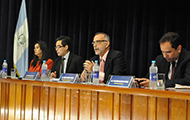
 Guatemala, March 16, 2012. Today, the International Commission against Impunity in Guatemala denounced the judge of the First Court of Children and Adolescents in Conflict with Criminal Law, Rossana Maribel Mena Guzmán. The complaint was filed on the grounds that Mena Guzmán allegedly committed malfeasance of office, abuse of authority, omission and alteration of marital status, usurpation of authority, failure to report an offence, malicious delay, human trafficking and maltreatment of minors.
Guatemala, March 16, 2012. Today, the International Commission against Impunity in Guatemala denounced the judge of the First Court of Children and Adolescents in Conflict with Criminal Law, Rossana Maribel Mena Guzmán. The complaint was filed on the grounds that Mena Guzmán allegedly committed malfeasance of office, abuse of authority, omission and alteration of marital status, usurpation of authority, failure to report an offence, malicious delay, human trafficking and maltreatment of minors.